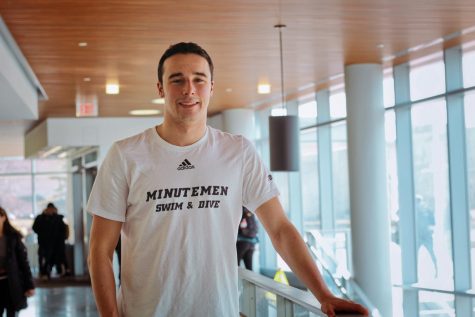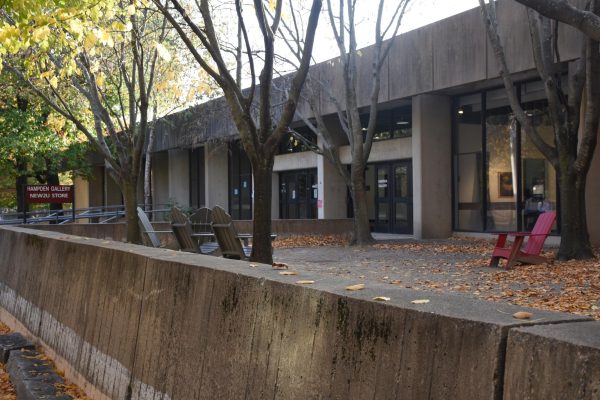“Penn Face:” The ugly truth about mental health on college campuses
“What Made Maddy Run” by Kate Fagan is the story of a 19-year-old girl named Madison Holleran, a track runner and student at the University of Pennsylvania. According to Fagan’s article Split Image, Holleran was beautiful, talented and successful, the epitome of what every young girl hopes to become.
But underneath the veneer of perfection, she was struggling. She wasn’t performing as well as she wanted academically and athletically. Holleran tried to hide her struggles with mental health while pursuing personal achievement and success, a phenomenon dubbed “Penn Face” by students at the highly competitive UPenn. But she was battling with anxiety and depression, and in the middle of her freshman year, she ended her life by jumping from a building in the middle of downtown Philadelphia.
Fagan, who spoke at UMass last year, is sharing Holleran’s story in an attempt to affect change in how mental health is treated on college campuses.
Sadly, Maddy Holleran is just one of many stories of anxiety and depression in college students. So what needs to change so that administrators and students alike can recognize when someone is depressed or suicidal?
The first thing that needs to change is the way mental health issues in young adults are treated. According to the Center for Disease Control, suicide is the second leading cause of death among people ages 15-24. Thirty percent of students have seriously considered attempting suicide from 2012-2013, a huge increase from 2010-2011 at 23.8 percent.
Because of this increase, a lot of universities began to develop screening tools and brief consultations to determine the needs of each student quickly. For example, the University of Texas at Austin created a Brief Assessment and Referral Team (BART) which gives students access to a brief assessment with a trained counselor who refers them to the appropriate level of care.
BART and similar programs are effective because they allow students to see a professional in a timely matter. Almost immediately after they make an appointment, a professional is speaking to them about their problems and providing them with care based on how much help they need, rather than allowing negative thoughts to fester for weeks.
Another popular organization among students and counseling centers is Active Minds. They have over 400 student-run chapters throughout the U.S., and has become the voice of young adult mental health advocacy nationwide. For example, “Send Silence Packing” is a nationally recognized traveling exhibition where 1,100 donated backpacks are placed in a high traffic area of campus, such as the campus quad, to give a visual representation of how many college students commit suicide each year.
“It helps students recognize the need to pay attention, because we all have a role to play in preventing suicide,” Sara Abelson said in an interview with The American Psychological Association. Abelson is the senior director of programs at Active Minds.
Programs such as Send Silence Packing are less effective for treatment than programs like BART, but are more effective for suicide awareness. The problem with focusing solely on awareness is that unless something is actually changed, it doesn’t help students get the care they need. Creating awareness is ineffective unless change is made because of it.
If suicide on campus is ignored rather than openly discussed, students aren’t going to speak up for themselves or their friends. Suicide needs to be talked about in order for students to be more willing to share their own struggles with suicidal thoughts. If students feel more comfortable talking about mental health issues, it’s going to be easier for them to approach someone who can help them if they’re feeling depressed or suicidal.
Here at UMass, one way that students can discuss their mental health struggles is at the Center for Counseling and Psychological Health (CCPH). According to the department’s official website, the CCPH offers a variety of services including, “crisis intervention, short-term psychotherapy for individuals, couples and families, support and therapy groups, psychological assessment, behavioral medicine, psychiatric services and eating disorders consultations.”
The Psychological Services Center (PSC) located in Tobin Hall also offers various therapy services to UMass students.
I think a program that UMass and other universities should implement is a “Mental Health Week.” A few weeks before finals, students can come to the Student Center and find help. This could include a doctor talking about what stress does to your body and the easiest and quickest ways to relax. Another example would be allowing students to speak with people who work at the psychiatry centers and learn how to create an appointment on their own. These ideas are simple and cost-effective, and offer students the help they need.
The next thing that needs to change is universities need to do a better job of destigmatizing failure, and teach students that it is an essential part of the learning process, not a bug that can be ironed out with more studying. A new initiative at Smith College called “Failing Well” is doing just that.
The initiative includes a number of workshops about topics such as impostor syndrome, perfectionism and stress culture, and overthinking. The workshops are used to teach students that their self-worth isn’t dependent on their success. When students enroll in the program, they receive a permission slip to fail. It tells them that even if they mess up a friendship, a hook-up, an exam, an extracurricular activity, etc., that they’re still a “totally worthy, excellent human.”
“For a long time, I think we assumed that this was the stuff that was automatically learned in childhood: that everyone struck out at the baseball diamond or lost the student council race,” said Donna Lisker, Smith’s dean and vice president for student life, in an interview with the New York Times.
But most kids don’t learn these lessons. They are taught that failure is something to be avoided, rather than to embrace and accept it as a part of life. A simple change professors can make is drop the lowest test grade in their class, allowing students to get a high grade in their class even if they fail a test. It’s a big safety net, but it allows students to accept their failure and do better on the next exam without punishing them. Administrations can make simple changes such as allowing students to take a certain amount of courses pass/fail, in order for them to take courses that interest them without fearing how it will affect their GPA. At UMass, students may elect one course to be pass/fail per semester, though that class no longer counts toward a General Education requirement, or a major requirement in some cases.
Lastly, due to the high stress that universities create, they should concentrate their efforts on implementing programs that allow students to decompress. Universities such as Gettysburg College hold “Dog Days,” an event that allows students and faculty to bring their dogs during the first two weeks of school to play with, which helps students get to know other students and faculty members in a non-stressful environment.
“If you get to know the dog, you can get to know the person,” Kathy Bradley said in an interview with Gettysburg Counseling Services. Kathy is the director of the Health & Counseling Center, associate dean of College Life and creator of Dog Days.
One of the most important and simplest ways administrators can help students is to make them more aware of the resources at their disposal when they’re feeling depressed. Something as simple as an email telling students phone numbers they can call or how to make an appointment with an on-campus psychiatrist is beneficial. Another simple measure is having RAs set up weekly or biweekly floor meetings, and allow students to discuss their problems with each other. Not only is it a good way for students to make new friends, it allows them to talk to people who might be going through similar struggles as them, and work together to find ways to overcome them.
“If a student has one connection on campus — from a custodian to the president — we’re more likely to retain that student. And it addresses students’ homesickness and well-being,” she added.
Other schools are working on similar decompression programs. Holy Cross, for example, hosts Midnight Breakfast, which allows students a chance to take a break from studying for finals with eggs, bagels and an assortment of other breakfast foods.
Simple events like these that help take students’ minds off of the stress of higher education are cost-effective ways for universities to improve student morale. Such measures should be embraced by all universities in order to combat mental health issues among college students.
Email Harry at hortof@umass.edu, or follow him on Twitter @harry_ortof.

Email Harry at hortof@umass.edu, or follow him on Twitter @HarryOrtof











